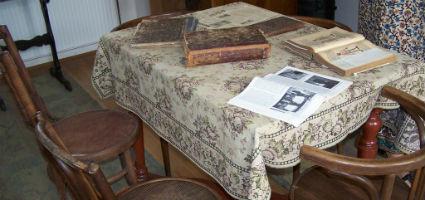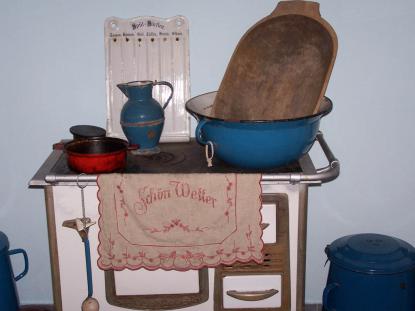2024. April 24. Wednesday
German Minority Village House - Pilisborosjenő
 |
Address: 2097, Pilisborosjenő Fő u. 49.
Phone number: (26) 536-091
Opening hours: 15.04-01.11.
On prior notice |
The two oldest villages in the Buda Hills, Vörösvár and Borosjenő, were documented as Weindorf in 1695. The Germans definitely arrived in unregistered groups; neither their number nor their origins are established. The arrivals probably came from South German provinces. According to unwritten tradition they came from the Black Forest.
The village’s name came from viniculture (Weindorf meaning ‘Grape Village’, so did the wealth of the village. Most of the population was involved in agriculture but the village was also self-sufficient from the point of view of economy and trade. The first document meantioning a factory worker is from 1861.
The U-shaped building known as the German Minority Village Museum was built in 1920 and has been open with exhibitions since 2006. The owner of the house used to be the landholder Alfréd Szedlák.
The main building of the Village Museum is made up of a community room. The Local History Collection by it is a period kitchen and a room where articles used on a daily basis and period folk clothing of the Swabian peasants are to be seen.
No economy buildings were preserved only the coal attic and three cellars of which two were reconstructed. Local winemakers offer their own produced wine. Wine contests and wine tasting are also regularly held in the cellars.
The German Song Group frequently rehears in the building. Local history classes for the local primary schools are also held there. The roofed stage by the Village Museum, its large yard, wine cellars and the new oven for bread baking are excellent location for village programs, in addition to concerts and various other events focusing on preserving tradition.
The village’s name came from viniculture (Weindorf meaning ‘Grape Village’, so did the wealth of the village. Most of the population was involved in agriculture but the village was also self-sufficient from the point of view of economy and trade. The first document meantioning a factory worker is from 1861.
The U-shaped building known as the German Minority Village Museum was built in 1920 and has been open with exhibitions since 2006. The owner of the house used to be the landholder Alfréd Szedlák.
The main building of the Village Museum is made up of a community room. The Local History Collection by it is a period kitchen and a room where articles used on a daily basis and period folk clothing of the Swabian peasants are to be seen.
No economy buildings were preserved only the coal attic and three cellars of which two were reconstructed. Local winemakers offer their own produced wine. Wine contests and wine tasting are also regularly held in the cellars.
The German Song Group frequently rehears in the building. Local history classes for the local primary schools are also held there. The roofed stage by the Village Museum, its large yard, wine cellars and the new oven for bread baking are excellent location for village programs, in addition to concerts and various other events focusing on preserving tradition.
